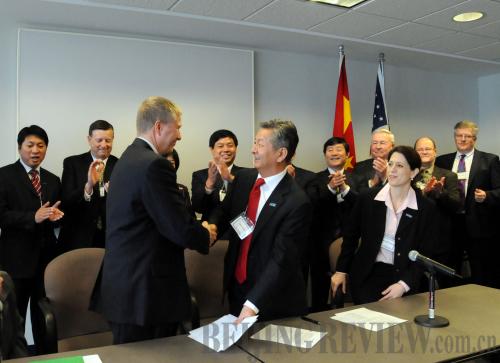|
Starting with smaller acquisitions or simply gathering core technologies, as opposed to acquiring the whole company that would require complex cross-border management expertise, is a wise move for companies looking to expand, said Zuo Xiaolei, Chief Economist with the Beijing-based China Galaxy Securities Co. Ltd. "There appears to be increased deal-making savvy and awareness of the pitfalls overseas among Chinese companies," she said.
 |
|
EYEING OVERSEAS: Fang Jianyi (middle), Chairman of the Board of Beijing West Heavy Industries Co. Ltd., and Fred Bellar, General Director of Mergers and Acquisitions for Delphi Corp., shake hands after signing an agreement in November 2009. Beijing West Heavy Industry has agreed to acquire the brake and suspension parts business of the U.S. auto parts maker Delphi (HU GUANGYAO) | Chinese firms also must have a clear long-term strategy of internationalization, instead of sheer speculation to take advantage of market lows, said Li Ming, a China-based partner at PwC. The Japanese would usually set up an office in the target country, but further preparations before any substantial expansions were made would take years, Li said.
It would also be easier for Chinese firms to first grow in emerging markets where distribution channels are not deeply entrenched and local competition is not insuperable, she added. The home appliance manufacturer Haier, for example, is faring well in India thanks to cheap labor and a lack of competitors. After acquiring the refrigerator unit of local rival Anchor Daewoo in August 2007, the Chinese white goods maker was able to save 30 percent of its production and distribution costs, and doubled its market share in India to nearly 5 percent in 2008.
In its latest move, Haier in May 2009 agreed to take a 20-percent interest in the struggling Fisher & Paykel Appliances (FPA) of New Zealand, which focuses on higher-priced products. The tie-up would allow the Chinese group to tap into high-end niche markets and two seats on FPA's board to increase its management expertise. The deal gives the two companies exclusive distribution rights for each other's products in their respective home markets. They also agreed to use each other's factories to make the partner's branded products.
Promising outlook
Looking ahead, economists expect Chinese companies to continue revving up their deal-making machines as they look for greater returns and risk diversification away from domestic markets. The country is also coming under pressure to make better use of its increasing foreign exchange reserves mostly parked in low-yielding U.S. Treasury bonds.
Zhang Bin, a senior researcher with the Chinese Academy of Social Sciences, said it is a matter of time before Chinese firms graduate from being mere low-cost manufacturers to establishing global reputations. To achieve this, they need to move up the learning curve quickly and gain experience with cross-border operations, he added.
Chinese firms will have to dig deeper into their pockets for resources since global commodity prices have already staged a prolonged rally, said Xing Houyuan, Director of the Research Center for Overseas Investments under the Chinese Academy of International Trade and Economic Cooperation, a think-tank affiliated to the Ministry of Commerce.
In addition, the central bank is likely to tighten domestic monetary policies this year, making it harder for companies to finance merges and acquisitions, added Xing.
Major Chinese Outbound Mergers and Acquisitions in 2009
In May 2009, PetroChina agreed to acquire a 45.51-percent stake in Singapore Petroleum Co., in a deal worth almost $1 billion.
In June 2009, China Minmetals Corp. clinched a $1.39-billion deal to buy a number of prime assets from Australian miner OZ Minerals Ltd.
In August 2009, Sinopec agreed to pay $7.56 billion for Addax Petroleum Corp., an oil producer listed in Toronto and London. The deal was the largest outbound investment made by a Chinese company to date.
In August 2009, Shandong Province-based Yanzhou Coal Mining Co. Ltd. agreed to pay $3 billion for the Australian coal miner Felix Resources Ltd.
In December 2009, Xi'an Aircraft Industry (Group) Co. Ltd. agreed to purchase a 91.25-percent stake in Austrian aircraft maker Future Advanced Composite Components, in a deal worth around 100 million euros ($139.6 million).
In December 2009, Geely Automobile Holdings Ltd. reached an initial agreement with Ford Motor Co. to buy the American auto giant's Volvo brand.
| 